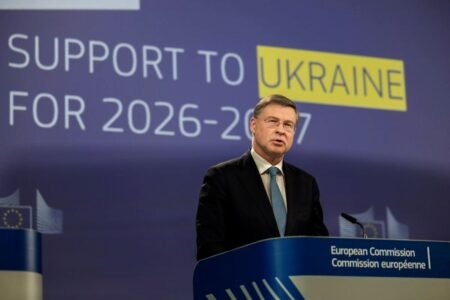(BRUSSELS) – The EU Commission presented the European Semester Spring Package Wednesday, providing fiscal guidance to Member States as they continue the process of gradually reopening their economies.
This guidance aims to help Member States strengthen their economic recoveries, making the best possible use of the Recovery and Resilience Facility (RRF), the key instrument at the heart of NextGenerationEU. The European Semester has been adapted this year, given the links to Member States’ recovery and resilience plans, laying out the investments and reforms that the RRF will finance.
“We are presenting this ‘Special Edition’ of the Spring Package at a pivotal moment, with our recovery around the corner but with the road ahead still paved with unknowns,” said EC vice-president Valdis Dombrovskis.
The EU is prolonging the general escape clause in 2022, with a view to deactivating it in 2023. Mr Dombrovskis said Brussels is encouraging Member States to maintain supportive fiscal policies this year and next, preserving public investment and making the most of the funding from the EU’s Recovery and Resilience Facility to boost growth.
The activation of the general escape clause of the Stability and Growth Pact in March 2020 allowed Member States to react swiftly and adopt emergency measures to mitigate the economic and social impact of the pandemic.
The EU executive says Member States should avoid a premature withdrawal of support and make full use of the RRF funding. The implementation of investments and reforms within the RRF will help to support the economic recovery, foster higher potential growth and employment, reduce imbalances and improve public finances. In 2022, national fiscal policies should become increasingly differentiated, while all Member States should preserve investments to support the recovery. Once conditions allow, Member States should pursue policies to ensure fiscal sustainability in the medium term.
The Commission has adopted a report under Article 126(3) of the Treaty on the Functioning of the EU (TFEU) for all EU Member States except Romania, which is already in the corrective arm of the Pact. The purpose of this report is to assess Member States’ compliance with the deficit and debt criteria of the Treaty. The analysis suggests that the deficit criterion is fulfilled by Bulgaria, Denmark, and Sweden and not fulfilled by all other Member States. The debt criterion is not fulfilled by 13 Member States (Belgium, Germany, Greece, Spain, France, Croatia, Italy, Cyprus, Hungary, Austria, Portugal, Slovenia and Finland).
The Commission considers that, at this stage, a decision on whether to place Member States under the Excessive Deficit Procedure should not be taken. In the case of Romania, the Commission recommends updating its fiscal adjustment path, targeting a correction of its excessive deficit in 2024.
The Commission has identified macroeconomic vulnerabilities related to imbalances and excessive imbalances for the 12 Member States selected for in-depth reviews in the 2021 Alert Mechanism Report. Three Member States continue to experience excessive imbalances (Cyprus, Greece, and Italy) and nine others are experiencing imbalances (Croatia, France, Germany, Ireland, the Netherlands, Portugal, Romania, Spain, and Sweden).
The implementation of reforms and investments under the RRF is expected to help address the challenges identified over previous Semester cycles and play an important role in addressing existing macroeconomic imbalances.
The Commission has adopted the tenth enhanced surveillance report for Greece. The report concludes that, despite the challenging circumstances caused by the COVID-19 pandemic, Greece has taken the necessary actions to achieve its specific commitments.
The Commission has also adopted the post-programme surveillance reports for Ireland, Spain, Cyprus, and Portugal. The reports conclude that the repayment capacities of each of the Member States concerned remain sound.
Employment Guidelines set common priorities for national employment policies with a view to making them more inclusive and fair. The Guidelines, adopted in October 2020, were updated to integrate the environmental sustainability and digital dimensions, reflecting the Strong Social Europe for Just Transitions Communication and integrating the UN Sustainable Development Goals (SDGs). They also addressed the consequences of the COVID-19 crisis, providing specific guidance aimed at mitigating the employment and social impact of the crisis.
The Commission now invites the Eurogroup and Council to discuss the package and endorse the guidance offered today.
The European Semester 2021 Spring Package: Questions and answers
The European Semester 2021 Spring Package – Documents








